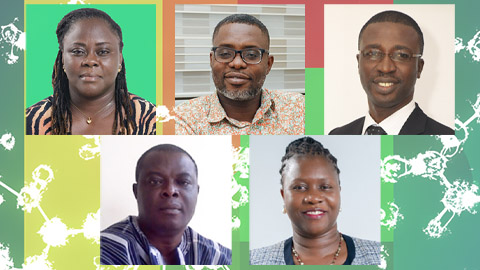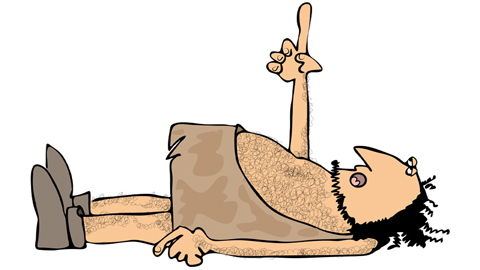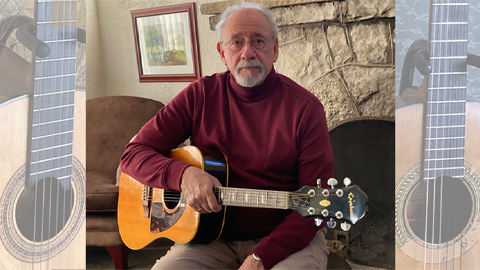Come and knock on my door
When I introduce myself lately, I have to remember not to say, “I’m a postdoc.” About a year ago, I became the only research assistant professor in the vascular surgery division at Northwestern University Feinberg School of Medicine. I’m still learning the ropes.
I’m a Ph.D. who gets emails about scheduling operating-room time, since I’m in a department full of surgeons. I’m a nontenure-track faculty member who has no use for invitations to seminars about new classroom software, because I don’t teach. On top of all that, I’m the guy who feels a little awkward at the lunch table, because I got promoted above my postdoc and grad student friends. I still feel strange calling myself a professor, because I don’t have my own lab, but that’s what’s on my new business cards and the placard outside the door to my new office.
And now the professorship is starting to feel more real. When the phone rings on my desk, I know it’s for me and not one of five other people in the lab. When I want to hang up my coat, I can use a hook behind the door instead of hanging it on the back of my chair and having it drag across the lab floor. When someone wants to ask me a question, he or she knocks on my door and asks to come in as opposed to just walking up to my desk and firing away.
.jpg)
I was offered this new faculty position after proving myself as a postdoc for five years. Over that time, I acquired quite a lot of responsibilities in the lab, which I am still fulfilling in my new role. These include bench work, data analysis, manuscript preparation, grant writing, equipment repair, computer help, inventory management, and mentoring undergraduate students, postdocs and surgical residents doing research in the lab.
The overall focus of the lab is nitric oxide vascular biology, with an emphasis on keeping blood vessels open after surgical interventions. After a blockage such as an atherosclerotic plaque is removed from an artery, the inflammatory environment causes aggressive cellular proliferation, which often leads to diminished blood flow. We’ve shown in animal models that administering NO at the site of the intervention prevents cellular proliferation. My research focuses on determining the molecular mechanism by which NO is causing these effects in the vasculature. Specifically, I study the ubiquitin-proteasome pathway, which is responsible for breaking down short-lived proteins in our cells. This includes the cyclins that allow for proper cell cycle progression. NO is known to affect the cell cycle, and we’ve seen that it does this by regulating the ubiquitin-proteasome pathway. Basically, when the cell cycle is arrested, cells can’t multiply and block off the blood vessel.
While the promotion changed my day-to-day life in the lab, I still get to do all the things I did as a postdoc. I still enjoy seeing the light go on in someone’s eyes when he or she grasps something I’m explaining to them. I get to keep up on the latest scientific advances and apply them to my work. I still participate in our floor’s interdisciplinary journal club. But I am also tasked with more personnel and administrative matters, like interviewing undergrads and running lab meetings, and I am working on more interdepartmental collaborations. I am directly reviewing manuscripts for journals and working on ideas to get my own funding as well as helping my boss with her grants. Lastly, I am gaining some understanding of how the faculty and administration interact.
People ask me all the time, “Don’t you want a tenured position where you have your own lab?” The truth is this position is perfect for me, because I don’t want to be on the tenure track right now. My wife and I have two young daughters. The next five years should be spent watching them grow up – not toiling in the lab for a tenure-track professorship that may not exist. According to a recent report from the American Federation of Teachers, the percentage of positions at public, four-year universities that were tenured or on the tenure track dropped from 51 percent in 1997 to 39 percent in 2007. While the numbers across all institutions aren’t so stark — they dropped from 33 percent to 27 percent — I’d rather see my wife, carve jack-o-lanterns with the kids and take them trick-or-treating while they still want to be seen with me.
As I have stepped into this role over the last year, I have not only been trying to make my own way but also to make a path for others who will fill these positions in the future. So here’s some advice. Use your time wisely and find a balance. Take on new challenges, but say no to things if you can’t make time to do them well. Use your knowledge and connections to help others, but take time away from the lab for yourself so you don’t burn out. Eat lunch with your colleagues, but go to yoga class twice a week on your lunch hour to clear your mind. Make yourself available to others, but don’t check work email at home. (This is easier said than done, especially with a smartphone in your pocket keeping you constantly connected.) Finally, try on your new title and walk through that next door, but don’t be afraid to leave it open so people can come in and chat.
Enjoy reading ASBMB Today?
Become a member to receive the print edition monthly and the digital edition weekly.
Learn moreFeatured jobs
from the ASBMB career center
Get the latest from ASBMB Today
Enter your email address, and we’ll send you a weekly email with recent articles, interviews and more.
Latest in Opinions
Opinions highlights or most popular articles

Getting to know scientists half a world away
In a program at Wellesley College, students interview and write about researchers at a university in Ghana.

Let’s make ASBMB awardees look more like BMB scientists
Think about nominating someone outside your immediate network.

A paleolithic peer review
You might think review panels have only been around for the last century or so. You would be mistaken.

Early COVID-19 research is riddled with poor methods and low-quality results
The pandemic worsened, but didn’t create, this problem for science.

So, you went to a conference. Now what?
Once you return to normal lab life, how can you make use of everything you learned?

My guitar companion
A scientist takes a musical journey through time and around the world.

